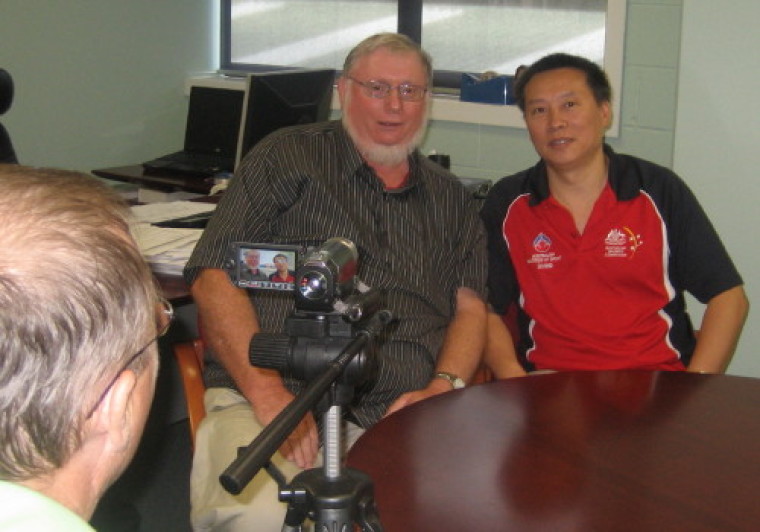
This Australian Missionary News IPTV interview with Hui Tong can be viewed athttp://tv.bushorchestra.com/Sport/videopages/hui_tong.html and www.safeworlds.net
Australian Missionary news IPTV anchorman Mark Tronson asked Hui Tong about his own diving experience. He explained that when he was 11 years old, a coach saw his talent and he was invited to the high performance diving centre in Beijing. In 1977 he was one of the National Junior Divers and by 1979, when he was 15, he had won his first national title.
The highlight of his career was the 1984 Los Angeles Olympics when he was permitted for the first time to test his diving skills in the international sphere, where the cultures, society and mentality were different from China: but the diving was no different. It was an arena where he could pit his skills against the best the world. He finished fourth.
Over the next four years, he won two High Dive 10 metre World Cups, married Xing who was the Chinese Women's Champion, and became a trainee coach. In 1989 he retired from International competition to concentrate on coaching.
As International Diving is a close knit affair and everyone gets to know each other, he asked a Canadian diving coach how he might do an exchange in Canada.
This enquiry led he and Xing moving to Canada to coach junior divers, and this in turn led to coaching the Canadian national diving team at both the 1996 Atlanta and Sydney 2000 Olympics.
He fell in love with Australia, and when an Australian High Performance Manager asked Hui Tong whether he might coach the Australian team, he jumped at the opportunity. He started as Head Coach of both the Australian and AIS Diving Unit in January 2001.
Hui Tong explained that the pressure on divers is no different from that of other sports people. They have expectations from within themselves as well as the pressures from coaches, competitors and family – and even those in administration. Becoming both mentally and physically fit is essential.
The AIS Diving Unit offers young divers the opportunity to connect all these dots, and Chantelle Newbury, the Athens Diving Gold Medallist, is on hand to identify up-and-coming diving talent. Once the new recruits are at the AIS Diving Unit, one of the tasks of Hui Tong and his coaches is to change their thinking in training, discipline and commitment.
With all these pressures, Hui Tong explained that Respite becomes imperative. He has taken his family and his coaching team on Respite to Basil Sellers Tweed (the respite facility run by Mark Tronson of Well-Being Australia) at different times.
Hui Tong emphasises three factors. Firstly, when he is on Respite, he can leave Diving behind and just relax and enjoy the scenery or the beach or time with family.
Secondly, the Basil Sellers Tweed facility is like home: everything is there, the facility is superb.
Thirdly, and perhaps most importantly, while there, Mark and Delma Tronson provide pastoral support and advice, which is an added bonus and greatly appreciated.